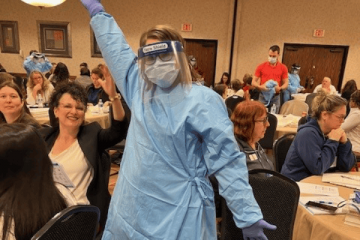
Jenny looked at her father moving restlessly in the hospital bed across from her. I asked her, “If your father were able to sit here next to us and talk with us, what do you think he would say about everything that’s been happening over the last few weeks?”
“I know he would hate this so much,” Jenny replied. “He wouldn’t want to be stuck in a hospital bed. We just never talked about it beyond that . . .”
What is Advance Care Planning?
As a physician, I have had many versions of this conversation over the years – with daughters, husbands, grandchildren, and neighbors. Loved ones want to do the right thing, but they also struggle with feeling overwhelmed and underprepared to advocate for a patient’s wishes.
Advance care planning is the process of discussing and preparing for future decisions about medical care in case a person becomes seriously ill or is not able to communicate their wishes. These discussions benefit adults of any age and in any state of health. The conversations equip a patient’s loved ones with the information they need to discuss different tests and treatment options with the patient’s doctor and to advise on which ones would be in line with the patient’s goals.
In some circumstances, patients have assumed that their loved ones would know what they would want in an emergency or prolonged illness. Unfortunately, this is often not the case, and the loved ones may feel guilty about opting for anything less than all possible interventions in the absence of prior discussions.
Even with advance care planning in place, however, a physician will not ask loved ones to make medical decisions on behalf of a patient without guidance. Instead, once I understand a patient’s values and preferences, I combine that with my medical knowledge and the patient’s specific situation and make every effort to provide recommendations that are most in line with the patient’s wishes.
Why is Advance Care Planning a Gift?
One of the most lasting gifts that a patient can give their loved ones is advance care planning. These discussions allow the person to feel that their job is to carry out someone’s wishes and not to make life and death decisions. When loved ones have to make decisions all on their own, they can feel guilt, anxiety, and depression, and they may not be able to grieve in a way that is restorative. Advance care planning thus relieves a substantial burden on the designated decision-maker. When a doctor adds their input, the loved one is left with the much less stressful task of confirming that the plan is consistent with what the patient would have wanted or that different options need to be considered.
Advance care planning is also a gift to the patient themselves because it helps to ensure that the patient gets all the care they want and none that they don’t.
How Should Someone Get Started?
A good way to start advance care planning is for the patient to think about who they would want to talk with the doctors about medical decisions on their behalf. It’s important for patients to ask that person if they are willing to serve as the patient’s decision-maker (also called a healthcare proxy). Designating an alternate person is also a good idea, just in case the patient’s healthcare proxy is not available in an emergency.
While there can understandably be a focus on paperwork and forms, the real heart of advance care planning is not in the paperwork but in the self-reflection and conversation. Loved ones need to understand what the patient’s values are, what matters most to them if time becomes short, and whether the patient prefers to focus on quality of life over possibly extending life.
It is also helpful when patients and their decision-makers understand that it is impossible to prepare for every possible medical scenario. Allowing some flexibility by expressing an overall approach and guidelines, rather than specifics, can best serve the patient’s wishes.
When Might Advance Care Planning Be Even More Important?
While advance care planning benefits all adults and their loved ones, some special circumstances make the process even more important. The complexity of these situations also makes documentation of a patient’s wishes essential.
Examples include patients with dementia or cognitive impairment, those without relatives or close friends, and those who are estranged from their families. If a patient has family but is choosing a non-family member to be their proxy or is designating someone who is not the next-of-kin (e.g., a grandchild instead of a son), their choices also require formal documentation. Another circumstance is when a patient’s religious or cultural beliefs may not be the same as their family’s or community’s beliefs.
One choice I hope that all patients document clearly is whether they would want to be an organ donor. Organ donation saves lives, but is a personal decision.
Final Thoughts
After my conversation with Jenny, she spoke with her brothers and sisters about how their father was doing and how we thought his illness was likely to progress. Jenny learned that one of her sisters had, in fact, discussed advance care planning with their father after their mother had passed away in the ICU. The sister was able to share with the rest of the family that their father felt strongly that he would not want any life-prolonging measures if there were little hope for recovery and independence after a serious illness.
Based on the father’s stated wishes, the medical team was able to make a recommendation to the family to transition to a comfort-oriented approach to care, as it would best align with what their father hoped for at the end of his life. The family agreed with the recommendation and felt grateful to be able to advocate for their father when he needed them most.
Navigating advance care planning can be difficult, but you don’t have to go through it alone. Our compassionate team at Healthcentric Advisors is here to provide support and resources to help make this process easier for you and your loved ones. Reach out to us for more information on starting these meaningful conversations.




